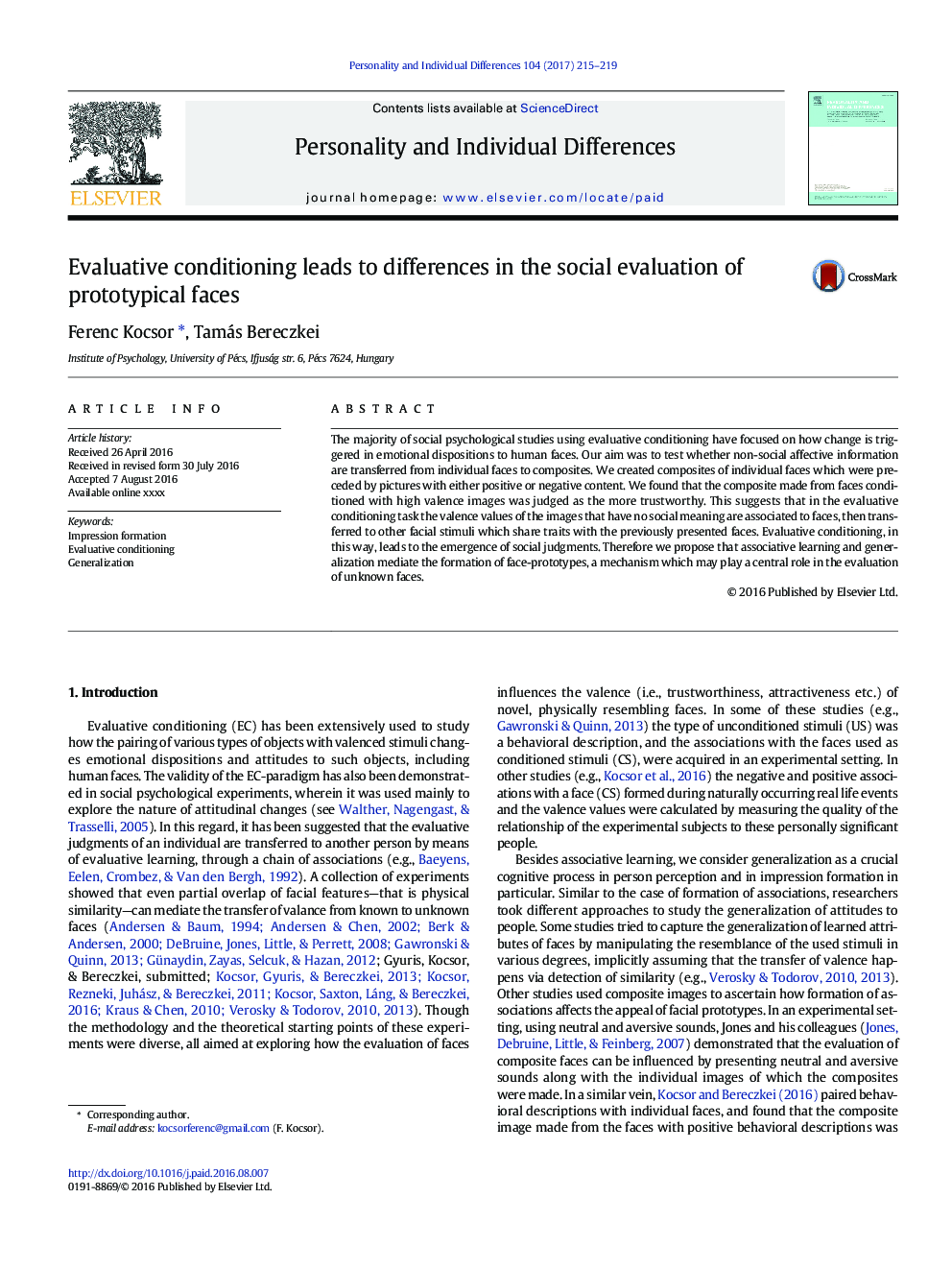| کد مقاله | کد نشریه | سال انتشار | مقاله انگلیسی | نسخه تمام متن |
|---|---|---|---|---|
| 7249473 | 1472014 | 2017 | 5 صفحه PDF | دانلود رایگان |
عنوان انگلیسی مقاله ISI
Evaluative conditioning leads to differences in the social evaluation of prototypical faces
ترجمه فارسی عنوان
تهیه ارزیابی منجر به تفاوت در ارزیابی اجتماعی چهره های اولیه می شود
دانلود مقاله + سفارش ترجمه
دانلود مقاله ISI انگلیسی
رایگان برای ایرانیان
کلمات کلیدی
شکل گیری افسردگی، تهویه ارزیابی، تعمیم،
ترجمه چکیده
اکثر مطالعات روانشناسی اجتماعی با استفاده از شرایط ارزیابی، بر روی اینکه چگونه تغییر در رفتارهای عاطفی به چهره انسان منجر می شود، متمرکز شده است. هدف ما این بود که آزمون کنیم که آیا اطلاعات عاطفی غیر اجتماعی از چهره های فردی به کامپوزیت ها منتقل می شود. ما کامپوزیت های چهره های فردی را که قبل از تصاویر با محتوای مثبت یا منفی پیش آمده بود، ایجاد کردیم. ما متوجه شدیم که کامپوزیت ساخته شده از چهره های مطابق با تصاویر با وضوح بالا به عنوان قابل اعتماد محسوب می شود. این نشان می دهد که در کار آماده سازی ارزیابی، ارزش والنتالی تصاویری که دارای معنی اجتماعی نیستند، به چهره ها مرتبط است، سپس به سایر محرک های صورت منتقل می شود که دارای ویژگی های مشترک با چهره های پیشین است. به این ترتیب، تهدید ارزیابی منجر به ظهور قضاوت های اجتماعی می شود. بنابراین ما پیشنهاد می کنیم که یادگیری وابسته و تعمیم به تشکیل نمونه های چهره می پردازند، مکانیسم که می تواند نقش مهمی در ارزیابی چهره های ناشناخته ایفا کند.
موضوعات مرتبط
علوم زیستی و بیوفناوری
علم عصب شناسی
علوم اعصاب رفتاری
چکیده انگلیسی
The majority of social psychological studies using evaluative conditioning have focused on how change is triggered in emotional dispositions to human faces. Our aim was to test whether non-social affective information are transferred from individual faces to composites. We created composites of individual faces which were preceded by pictures with either positive or negative content. We found that the composite made from faces conditioned with high valence images was judged as the more trustworthy. This suggests that in the evaluative conditioning task the valence values of the images that have no social meaning are associated to faces, then transferred to other facial stimuli which share traits with the previously presented faces. Evaluative conditioning, in this way, leads to the emergence of social judgments. Therefore we propose that associative learning and generalization mediate the formation of face-prototypes, a mechanism which may play a central role in the evaluation of unknown faces.
ناشر
Database: Elsevier - ScienceDirect (ساینس دایرکت)
Journal: Personality and Individual Differences - Volume 104, January 2017, Pages 215-219
Journal: Personality and Individual Differences - Volume 104, January 2017, Pages 215-219
نویسندگان
Ferenc Kocsor, Tamás Bereczkei,
